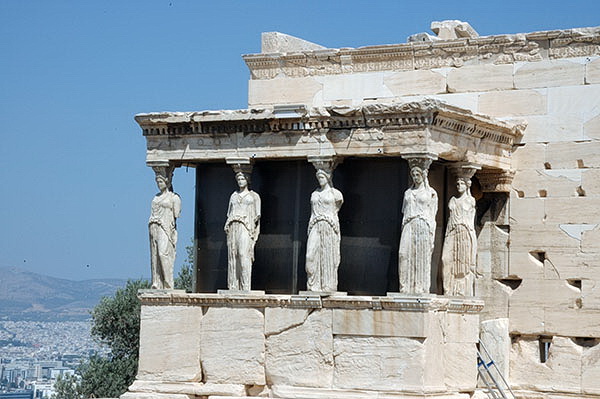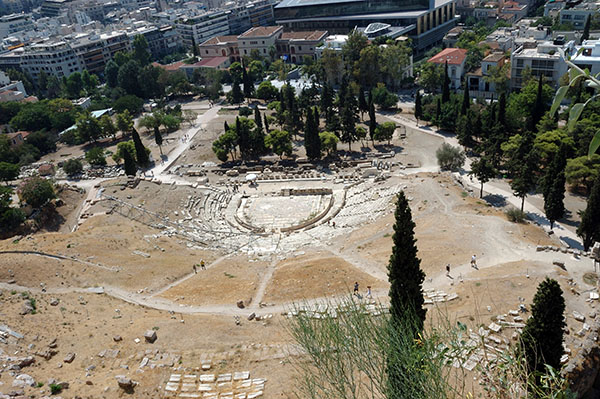Greek abbreviations Posted by Ourania on Jun 11, 2014 in Vocabulary
Sometimes, learners of the Greek language, but even native speakers as well, have difficulty understanding what all these abbreviations that we find in books, notes and reference tables stand for.
Here’s a great opportunity to see some of the most commonly used ones as well as to analyze what they mean or how they are used.
π.Χ. = πρό Χριστού (pro Hreestou)= B.C., before Christ.
Ο Παρθενώνας χτίστηκε τον 5ο αι. π.Χ. (O Parthenonas hteesteeke ton pempto eona pro Hreestou)
The Parthenon was built in the 5th century B.C.
μ.Χ. = μετά Χριστόν (meta Hreeston) = A.D., Anno Domini, after Christ.
Η Αγιά Σοφιά χτίστηκε τον 6ο αι. μ.Χ. (Ee Ageea Sophia hteesteeke ton ekto eona meta Hreeston)
The Hagia Sophia cathedral was built in the 6th century A.D.
αι. = αιώνας (eonas)= century.
Ο μεσαίωνας διήρκησε από τον 5ο ως τον 15ο αι. μ.Χ. (O meseonas deeeerkese apo ton pemto os ton dekato pemto eona meta Hreeston)
The Middle Ages lasted from the 5th until the 15th century A.D.
π.χ. / λ.χ. = παραδείγματος χάρη, λόγου χάρη (paradeegmatos haree, logou haree) = for example.
Για να φτιάξουμε την κάρτα, παίρνουμε τρία χρωματιστά χαρτιά, π.χ. ένα κόκκινο,
ένα κίτρινο κι ένα μπλε. (Geea na ftiaxoume teen karta, pernoume treea harteea, gia paradeegma ena kokino, ena kitrino ki ena ble)
In order to make this card, we take three colored papers, for example, a red, a yellow and a blue
one.
κ.ο.κ. = και ούτω καθ’ εξής (ke outo kathexees) = likewise, so on.
Έπαιρνε ένα χαρτί από την αριστερή στοίβα, το υπέγραφε και το τοποθετούσε στην δεξιά κ.ο.κ. (Eperne ena hartee appo teen areesteree steeva, to eepegrafe ke to topothetouse steen dexeea ke outo kathexees)
He took a paper from the left pack, signed it and placed it on the right pack, and so on.
κτλ. / κλπ. = και τα λοιπά (ke ta leepa)= etc., et cet., (et cetera), et al. (et alia), and others, and so forth.
Ήρθε όλη η τάξη, ο Πέτρος, η Άννα, η Ελένη, ο Νίκος, κλπ. (Eerthe olee ee taxee, o Petros, ee Anna, ee Elenee, o Neekos ke leepa)
The whole class came, Peter, Anna, Helen, Nick, etc.
π.μ. = προ μεσημβρίας (pro messemvreeas)= a.m., ante meridiem, before noon.
Η συνάντηση θα γίνει στις 10.00 π.μ. (Ee seenateesee tha geenee stees deka pro meseemvrias)
The meeting will take place at 10.00 a.m.
μ.μ. = μετά μεσημβρίαν (meta meseemvreean) = p.m., post meridiem, after midday, after noon.
Το τραίνο έρχεται στις 5.00 μ.μ. (To treno erhete stees pente meta messemvrian)
The train arrives at 5.00 p.m.
The following abbreviations are usually found in appendices, bibliographies, reference tables, notes, etc. but rarely in the actual text:
κεφ. = κεφάλαιο (kefaleo) = chapter.
Αυτό επέφερε επιδείνωση της κατάστασης, βλ. κεφ. 3. (Afto epefere epeedeenosee tees katastasees, vlepe kefaleo treea)
This made the situation worse. See chapter 3.
βλ. = βλέπε (vlepe) = see, look at.
[βλ. στο παραπάνω παράδειγμα]. (vlepe sto parapano paradeegma)
[look at the previous example].
τόμ. = τόμος (tomos) = volume.
Αυτό επεξηγείται καλύτερα στον 2ο τομ. (Afto epexeegeete kaleetera ston deftero tomo)
This is better analyzed in vol. 2.
σ. / σσ. / σελ. = σελίδα (seleeda) / σελίδες (seleedes) = page / pages.
Ολόκληρο το ποίημα μπορείτε να το βρείτε παρακάτω (σελ. 234). (Olokliro to peeeema boreete na to vreete parakato, seleeda deeakoseea treeanta tessera)
You can find the whole poem below (p. 234).
κ.ε. = και εξής (ke exees) = from now on.
Ο ενάγων, αναφερόμενος κ.ε. ως πατέρας, θα έχει τα παρακάτω δικαιώματα. (O enagon, anaferomenos ke exees os pateras tha ehee ta parakato deekeomata)
The plaintiff, from now on called the father, will have the following rights.

Build vocabulary, practice pronunciation, and more with Transparent Language Online. Available anytime, anywhere, on any device.
About the Author: Ourania
Ourania lives in Athens. She holds a degree in French Literature and a Master’s degree in Special Education for Children. Since 2008, she has been teaching Greek to foreigners.





